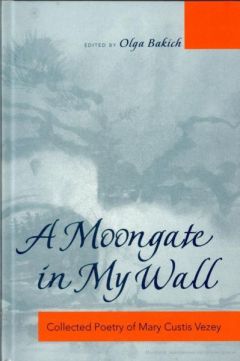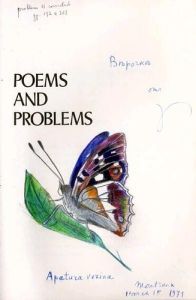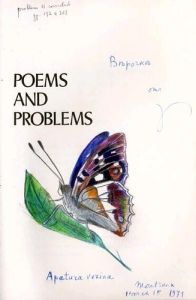Мария Визи - A moon gate in my wall: собрание стихотворений
551. «The white sands on the sloping shore of the river…»
He was almost as old as the river,
and he made more noise than the river itself
The white sands on the sloping shore of the river
lie silent, except for the lapping,
continuous lapping
of the yellow water
against the edge of the slope,
— the great mass of water
poured powerfully
down the deep trough of its old bed.
liven the water grasses,
crashing close to the current,
hold the wav'es of their surface
silently toward the sun.
Suddenly, a heavy splash disturbs the silence,
as the aged bulk of a huge river tortoise
turns swiftly
near the top of the yellow water,
to snatch a minnow.
552. «It was a lazy summer noon, as I sat in the stern of a flat-bottomed boat…»[246]
The blue parasol may have been becoming.
I do not know; I hope it was.
It was a lazy summer noon, as I sat in the stern of a flat-bottomed boat,
holding a blue parasol over my head and back.
My boatman rowed unhurriedly through the rushes,
the tall rushes crowding a narrow stream
across the Sung-Hwa-kiang.
I sat enjoying the blue of the sky,
the gold of the sun, the green of the grass and the ripples,
and I did not know whether I was pretty or not,
in my light summer gown,
against my light blue parasol —
I did not know whether I wras pretty or not,
I had not expected to meet you rowing towards me,
swiftly slicing the rushes with the sharp prow of your boat,
as you returned from your early morning fishing.
553. «He was a shepherd and he spent his hours…»[247]
A person encountered in the Western I lills near
Beitsing
He was a shepherd and he spent his hours
upon a hillside taking care of sheep.
He slept in his small hut of mud and straw
and ate his rice and sometimes drank his tea.
His hands were gnarled and grimy and his clothes
he hardly ever changed from month to month
for he was one of the unwashed who lived
so many li from rivers or a spring.
In early morning, when some stranger chanced,
dangling his dusty legs, on donkey back
to pass his hut, the friendly shepherd called
by way of greeting, —
«Have you had your rice?»
554. «At daybreak, as the skies lighten…»
Early morning in Beitsing: a sound fondly recalled.
At daybreak, as the skies lighten,
I roll up my window
and listen to my city.
The summer heat has not yet choked
the perfumed breath of night;
the dust in the street lies unwaken by pattering feet,
but the jingle of peddlers' wares
begins to reach my ears,
and then, what I await:
the whistling pigeon in the sky above Beitsing.
555. «When I was small I had a great vain dream…»[248]
Only the waters of the Ch'in and Wei
Roll green and changeless, as in years
gone by.
Po Chu-i
When I was small I had a great vain dream,
a kind of game just with myself alone:
because the fathers of my little playmates
were wrapped far more than mine in worldly riches,
I played that one fine day I would invite them
to my poor shabby door
and they would knock
and through that creaking door in that grey alley,
awestruck, would tiptoe into sparkling halls
bedecked with wealth and of surpassing beauty.
This never happened, nor did I regret it
for still they came, and still we played together.
Now years have passed and we have ail been scattered.
And all these many years I have been toiling
and have it seems at last built quite a palace
behind that gate, and have assembled in it
great wealth and beauty far belittling those
which once I dreamed of as a foolish child;
— So much to show, with humble pride and grateful,
to share and to enjoy, if they would knock
upon my gate, those small remembered playmates…
But I can hear the echo of their footsteps
running, then silenced far down winding alleys,
and in the myriad distant streets and cities
they cannot find the gateway to my house.
556. «The temple halls are musty; daylight never…»[249]
Om mani pad me kum.
The temple halls are musty; daylight never
disturbs the corridors or narrow stairs.
Blackened by dust and incense smoke and years
the ancient tapestries along the walls
from high carved vaulted ceiling to the floor
breathe not a ripple in the stifled air.
When nightfall stills the last long wailing chant
and joss smoke mingles with the stale burnt oil,
then once again the tapestries awake
with rats that live behind them, galloping,
galloping all night long, like a division
of cavalry on a parade, or rushing
to mortal combat with an enemy.
557. «We had walked many li over the flat autumn fields…»[250]
A winter storm starts suddenly over
lake Hanka.
We had walked many li over the flat autumn fields
and had reached the marshes
skirting the great lake.
Wild fowl were flying all over
under a blackening sky
and settling down urgently among the clumps of grass
seeking a refuge.
The vast expanse of lake was before us,
with nothing but tall grass growing profusely as far as
the eye could see
on all sides and behind us;
grass swaying
like a continuation of the lake surface.
Suddenly, without warning,
a sheet of wet white flakes fell from the sky,
and more followed, and more, hurrying,
swirling and joining the wind and the grass
in their frightening dance.
A storm.
558. «Swathed in its lace of slime…»
Swathed in its lace of slime,
the pond sleeps
at sunset.
High above the adobe hut
and the boat landing
rises a sharp-horned yellow moon.
What a comforting and pleasing lot —
Who can say fate is unkind?
The delicate filigree of willow' leaves
is black against the violet evening sky.
559. «Early snow falls…»
Early snow falls,
like wafted cherry blossoms —
peaceful and lazy —
into the pond,
the green one, where willows drop
and late water lilies are blooming.
There could not be a brighter or a larger star
than the one climbing
the partly darkening sky, and
hesitating over the edge
of the pensive village.
560. «San Shu was a boatman. He lived on an island…»
San Shu was a boatman. He lived on an island
in the middle of the great Sung-Hwa river,
in the north.
He rowed his flat-bottomed boat
very skillfully across the wide yellow grey expanse
from the shore of the city to the grassy flatlands
on the other side,
where lay the villages and the farms.
The Sung-Hwa was a pleasant sunny stream
and it earned the boatman's bread
all summer.
561. «From the direction of Mai Mai Cheng…»[251]
From the direction of Mai Mai Cheng,
rising over the Gobi desert,
across the Great Wall,
came a wind.
It picked up the sands of the desert
and became thick and brown
as the sands themselves,
as it hurled its destructive phalanges
into battle,
row upon powerful row.
I got up in the morning with a brown blanket about me
brown sand in my eyes and ears
and gritting between my teeth
and but a white spot on the bed
where my head had rested.
But many centuries this Gobi wind has blown
covering with its sands
myriad human bones and ancient dwellings.
Some far-off day a child,
playing in the swift sand,
will take a beautiful polished white bone
that will have been me,
and will take it to her father,
to make her a flute,
to sing a song.
Часть IV. Неопубликованные переводы
English into Russian
562. Maxwell Bodenheim (1893–1954). A Poet to his Love[252]
Серебряная церковь в чаше леса —
Моя любовь к тебе. Кругом деревья,
Украденные от тебя слова
И колокол, твоя последняя улыбка.
Дарованная мне, — повешен наверху.
Тот колокол звонит, когда ты входишь в лес.
Когда ты станешь около него.
Но звон его ненужный замолкает,
Когда ты начинаешь говорить.
28 ноября [1924 г.]
563. Abbie Huston Evans. A Niche from the Blast. Dell Concert.[253]
Здесь, где в одном пятне освещена
поверхность темная земного шара,
когда спускается на землю ночь
и яркая звезда на запад тонет,
тускнеют краски и темнеет небо
огромное, в то время как земля
неторопливо крутится, и небеса
воротятся, как колесо, — впервые
как будто, вижу я сегодня ночью,
что небосвод, действительно, повсюду
вокруг нас, и что сами мы летим
в пространство, хоть о том и забываем.
Везде вокруг — стремленье, шторм и крики
всего оркестра вместе; человек
свой голос собственный так страстно ищет;
день шелуху свою роняет; птица
ночная, вспугнутая, встрепенется,
в борьбе царапаясь сквозь бурю звуков.
И в нише освещенной среди тьмы,
как в найденном убежище минутном,
средь солнц несущихся, окружены
толпою сил неведомых и княжеств,
здесь тысячи обретших вдруг свободу,
почувствовавших близость с этим светом.
1960-е гг.




